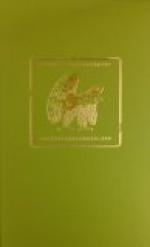Tisdale shook his head. “That road outside the clearing was simply a narrow, little used path; and I was so dead tired I began to look for a place where I might take an hour’s rest. I chose a big cedar snag a few rods from the trail, the spreading kind that is always hollow, and found the opening screened in fern and just wide enough to let me in. Almost instantly I was asleep and—do you know?”—the humor broke again gently— “it was late in the afternoon when I wakened. And I was only roused then by a light blow on my face. I started up. The thing that had struck me was a moccasin, and its mate had dropped at my elbow. Then I saw a can of milk with a loaf of bread placed inside my door. But there was no one in sight, though I hurried to look, and I concluded that for some unaccountable reason that inhospitable woman had changed her opinion of me and wanted to make amends. I took a long draught of the milk—it was the best I ever tasted—then picked up one of the moccasins. It was new and elaborately beaded, the kind a woman fancies for wall decorations, and she had probably bartered with some passing squaw for the pair. But the size looked encouraging, and with a little ripping and cutting, I managed to work it on. Pinned to the toe of the other, I found a note. It ran like this: ’Two Indians are trailing you. I sent them down-stream, but they will come back. They told me about that poor little papoose.’
“I saw she must have followed me that morning, while searching for her cow, or perhaps to satisfy herself I had left the clearing, and so discovered my hiding-place. The broader track of her skirts must have covered mine through the fern.”
Tisdale paused. The Aquila had come under the lee of Bainbridge Island. The Olympics were out of sight, as the yacht, heeling to the first tide rip, began to turn into the Narrows, and the batteries of Fort Ward commanded her bows; a beautiful wooded point broke the line of the opposite shore. It rimmed a small cove. But Mrs. Weatherbee was not interested; her attention remained fixed on Tisdale. Indeed he held the eyes of every one. Then Marcia Feversham relieved the tension. “And the Indians came back?” she asked.
“Oh, yes, that was inevitable; they had to come back to pick up my trail. But you don’t know what a different man that rest and the moccasins made of me. In five minutes I was on the road and making my best time up the gorge, in the opposite direction. The woman was standing in her door as I passed the cabin; she put a warning finger to her lips and waved me on. In a little while the ground began to fall in short pitches; sometimes it broke in steps over granite spurs where the exposed roots of fir and hemlock twined; then I came to a place where an immense boulder, big as a house, moving down the mountain, had left a swath through the timber, and I heard the thunder of the Duckabush. I turned into this cut, intending to cross the river and work




